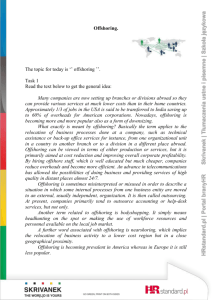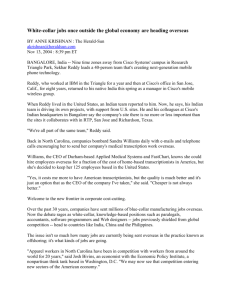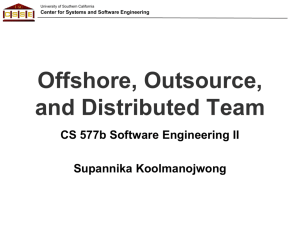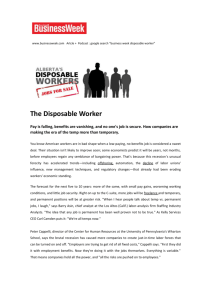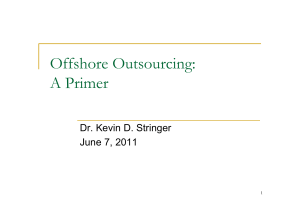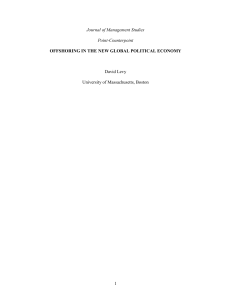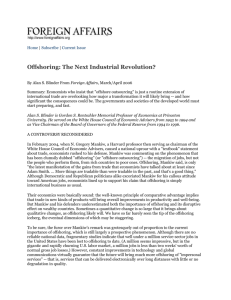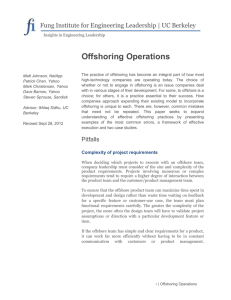fareastreview-onoffshoring
advertisement
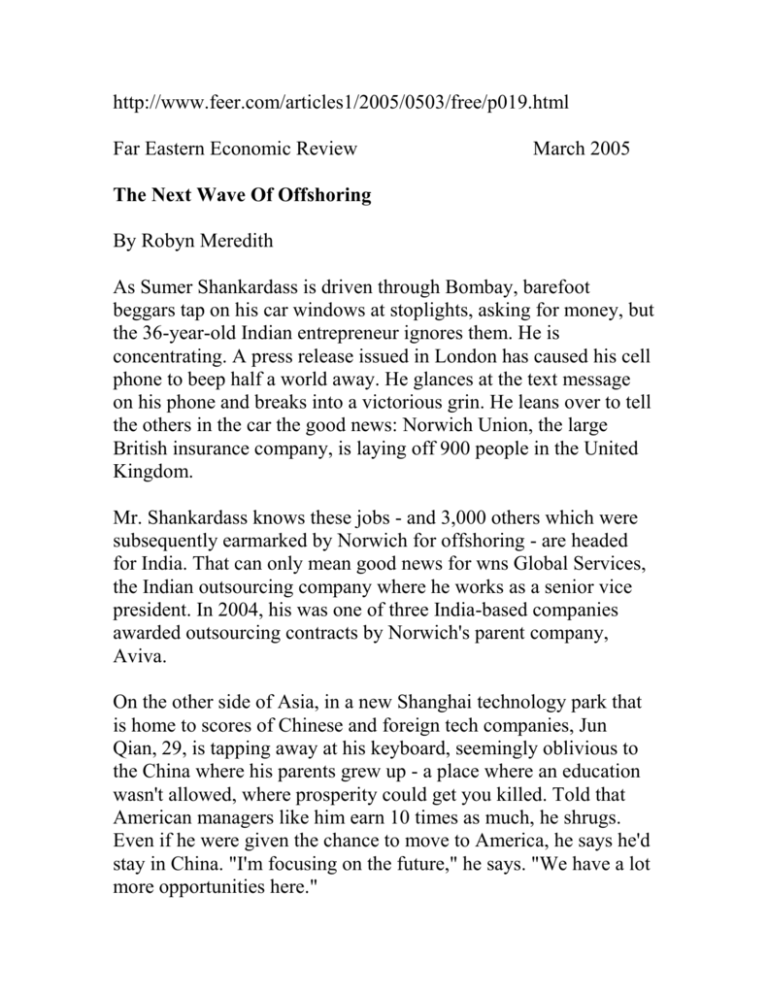
http://www.feer.com/articles1/2005/0503/free/p019.html Far Eastern Economic Review March 2005 The Next Wave Of Offshoring By Robyn Meredith As Sumer Shankardass is driven through Bombay, barefoot beggars tap on his car windows at stoplights, asking for money, but the 36-year-old Indian entrepreneur ignores them. He is concentrating. A press release issued in London has caused his cell phone to beep half a world away. He glances at the text message on his phone and breaks into a victorious grin. He leans over to tell the others in the car the good news: Norwich Union, the large British insurance company, is laying off 900 people in the United Kingdom. Mr. Shankardass knows these jobs - and 3,000 others which were subsequently earmarked by Norwich for offshoring - are headed for India. That can only mean good news for wns Global Services, the Indian outsourcing company where he works as a senior vice president. In 2004, his was one of three India-based companies awarded outsourcing contracts by Norwich's parent company, Aviva. On the other side of Asia, in a new Shanghai technology park that is home to scores of Chinese and foreign tech companies, Jun Qian, 29, is tapping away at his keyboard, seemingly oblivious to the China where his parents grew up - a place where an education wasn't allowed, where prosperity could get you killed. Told that American managers like him earn 10 times as much, he shrugs. Even if he were given the chance to move to America, he says he'd stay in China. "I'm focusing on the future," he says. "We have a lot more opportunities here." Around the world, a quiet revolution is taking place. It wasn't planned, it isn't political. But it is steadily marching, some might say leaping along, and - even if we wanted to - it can't be stopped. The revolution's name is offshoring, and while the concept is not new - manufacturing jobs have been moved to countries such as China and Mexico for years - what is different of late is the huge number of white-collar jobs that are being relocated abroad, and at a tempo and scale never witnessed before. And it's just starting. Over the next decade, offshoring will knock millions of white-collar Americans and Europeans out of work, blowing a hole in the middle class from Los Angeles to London, from Boston to Berlin, from Toledo to Tokyo, from Austin to Amsterdam. "I don't think most people appreciate the magnitude of the change in the world's workforce," says Intel's chief executive, Craig Barrett. "Over the next 10 years you are going to see major, major dislocation," he warns. He should know. Intel is hiring thousands of new workers overseas. Big and small companies alike in industry after industry have done the math and are rushing to move even their most specialized jobs to Asia to cut wages by between half and four-fifths. "We're now outsourcing investment banking to Mumbai," says Stephen Roach, chief economist at Morgan Stanley. "I don't know why we would ever hire another software programmer in New York again." In earlier years, offshoring, or the substitution of foreign for domestic labor, meant that an American dialing a toll-free number caused a phone to ring in India, or a German sending an e-mail to Microsoft got a reply from China. Now it means that sophisticated computer programs, once written in Silicon Valley, are coded in Bangalore. Medical X-rays, previously read by doctors in Frankfurt, are now being analyzed by medics in New Delhi. Bank clerks are crunching numbers in India and sending them electronically to New York. Material for animated movies is created now in Hyderabad, not Hollywood. This is the next wave of globalization, and it is shifting work to dollar-a-day factory workers and dollar-an-hour white collar workers in Asia. Alarm bells should be ringing for Americans and, even louder for Europeans: Fat, rich and spoiled Westerners have for several generations been shielded from workplace competition with the world's most populous nations. As both China and India open to the world for business, and advanced communications technology becoming more and more widespread, some one billion workers have suddenly been added to the world's labor pool. With an increase in the number of Asians qualified for white-collar jobs, people in the industrialized nations are suddenly discovering their high Western wages are no longer competitive. There is no single, authoritative source on the number of U.S. jobs lost to offshoring. In recent years, about 100,000 software-writing jobs have moved from the U.S. to India alone, according to the Economic Policy Institute. Those jobs would have paid a combined $136 billion a year in wages. By the end of 2005, one of every 10 jobs at U.S. information technology vendors and service providers will have moved offshore, according to data from the Bureau of Labor Statistics, Gartner and Morgan Stanley. Another 400,000 back-office jobs have already moved offshore and 3.3 million should move by 2015, according to Forrester Research. Vivek Paul, vice chairman of Indian IT giant Wipro, figures that over the next five years, 7% of U.S. white-collar jobs could be moved overseas, and a whopping 60% of software jobs. "There's very little economic rationale for having those jobs in the U.S.," he says. Here's the extent of the good news for middle-class America: If history is any guide, just over a third of those who are laid off because of offshoring will quickly find a new job and be no worse off, according to consultants McKinsey & Co. Just over half will have to take pay cuts of at least 15%. A quarter of those laid off will take pay cuts of at least 30%. European workers are even in worse trouble: those who lose jobs there are only half as likely as Americans to find new jobs within six months, according to McKinsey. European companies have traditionally lagged behind their U.S. counterparts in offshoring, but there is new evidence to show that this is changing. According to a survey of 500 companies conducted last year by the United Nations Conference on Trade and Development and consultants Roland Berger, four out of 10 European firms have begun to relocate service operations offshore, with 40% of all projects going to Asia, especially India. Yet European companies seem to be all too aware of the obstacles they face in fully embracing offshoring, chief among them tougher labor laws makes bidding adieu to unwanted staffers more difficult than is the case in the U.S. Add to that the need to serve customers in languages other than English, and the complexities of offshoring for European firms become apparent. Yet, they will have to overcome these difficulties, or lose out to their leaner U.S. competitors that have already shed droves of jobs at home. For Chicago techie David Huber, it is hard to be philosophical about how Asia's rise is changing the currents of the global economy. To him and others whose jobs can easily be moved abroad, the changes are all too personal. His last full-time computer-programming job paid $82 an hour - more than $170,000 a year. After months out of work, he accepted a temporary job paying $58 an hour. It lasted a few months. He finds himself worth less to employers, and that makes him feel worthless. He has watched companies with jobs to fill offer lowball salaries, then move the jobs to India when Americans won't work for wages that are dramatically lower than they are used to. "No job is safe," Mr. Huber says. To him, offshoring amounts to "dismantling the U.S. middle-class workforce." Cruel to Westerners, offshoring is cause for celebration in Asia. This migration of jobs is one of globalization's greatest achievements - a fast-rising living standard in poor countries that is propelling better - educated Asian workers into an expanding middle class. J.P. Morgan's new back office - a place where hotshot MBAs crunch numbers on stocks traded in New York, London and Tokyo - is nowhere near those legendary banking centers. Instead, it is in Bombay, India, across the street from a desperate slum. In glittering London and New York, those who win coveted firstyear investment banking jobs earn $150,000 a year and buy Porsches with their bonuses. Soon, there will be far fewer of them: Last year J.P. Morgan began hiring in Bombay at just $25,000 a year - not enough for a Toyota. Already there are 2,000 bankers and researchers in India, and within a few years, the company's plans call for up to 8,000 in India - half in Bombay and half in a new office planned for Bangalore. In Shanghai and Kuala Lumpur, in Delhi and Bombay, whitecollar denizens of the offshoring boom now gather at hip bars and pricey restaurants. It is as if the exuberance of Silicon Valley has moved to Asia. They spend their new paychecks on trendy Western clothes, trips abroad and new cars. Every month, two million more Indians and five million more Chinese carry cell phones as their countries grow richer. Young college graduates job-hop for ever-higher pay. The future has never looked brighter. While Chinese computer programmers splurge to buy the latest consumer goods, many will live with their parents until they are in their 30s, saving three-quarters of their $5,000-a-year salaries to buy a home or a car. That is not a sacrifice for them. It is an improvement. "It is not the best feeling in the world to know that I'm taking away someone's job," says Sheelan Chawathe, who answers phone calls from overseas customers of Delta Air Lines from a Bombay office. How did the vast movement of white-collar jobs come about? The Internet and other tech wizardry invented in the U.S. inadvertently laid the groundwork for a great leap forward in globalization. The boom in Silicon Valley produced not just dazzling new technological capabilities, but also extravagant parties, stratospheric California rents and truly exorbitant wages for computer programmers like David Huber, who were suddenly in short supply. American tech companies began using the H1-B Visa program to bring programmers from India to Silicon Valley to help during the crunch. Even with the temporary immigrant workers, American and European companies faced a drastic shortage of techies who could write boring computer code to fix y2k glitches. In desperation, they began the first large-scale experiments with offshoring: when they moved overflowing work to India, and found capable programmers on the cheap. It worked. Then, after Silicon Valley's new technology enabled companies to cheaply route phone calls over the Internet, companies tried moving $18,000-a-year jobs answering customer service calls to India. That worked too. So companies began asking what other white-collar work could move to India, and what other countries with cheap labor could be home to more jobs sent offshore. Meanwhile, the dot-com bust forced many tech companies to move more work overseas to save money if they wanted to survive. Now there is an exodus: Tens of thousands of Silicon Valley's $65,000a-year computer-programming jobs are on the move, and well-paid research and development work is quickly being shipped to lowcost China and India. Even accounting and law firms are sending tax and lawsuit preparation work offshore. Yet offshoring doesn't have to be all doom and gloom for Western countries. Economists say increased trade - globalization however painful for those who lose their jobs because of it, always brings more wealth to the world as a whole. Offshoring is already a net gain for the U.S. and for the country where the jobs land. Every dollar of spending that U.S. companies transfer to India creates $1.46 in new wealth, according to McKinsey research. India keeps 33 cents of that gain, while the U.S. keeps $1.13 for every dollar spent on offshoring. This means consumers in the West are big winners, too. Despite the pain felt by white-collar workers whose jobs are moved offshore, the jobs transfer will bring lower prices to the shores of the industrialized nations. Just as a flood of cheap factory goods appeared at Wal-Marts, Woolworths and Japan's 100-yen stores after factories moved to Mexico and China, costs are dropping for some service-related work. Take computers. The movement of IT hardware manufacturing offshore caused tech hardware prices to fall between 10% and 30% faster from 1995 to 2002 than they otherwise would have, according to the Institute for International Economics. Hardware and software prices will continue to drop as more computers are built in China and more software code written in India, according to the institute. Moving jobs in other fields will cause similar price drops. Americans may see a slowdown in the increase in medical costs as the vast, inefficient processing of insurance claims is moved offshore. China and India aren't the only ones trying to get in on the offshoring action. Call it revenge of the colonies, but any developing country with lots of English speakers and good Internet links is now a prime jobs magnet. Malaysia razed a jungle full of palm oil trees to build a high-tech industrial park to woo companies. The search for cheap office workers has led HSBC, Nokia, NTT, Shell, Cisco, Ericsson, Fujitsu, Cable & Wireless and more than 250 other foreign companies there. Philippines President Gloria Macapagal Arroyo has traveled to New York and London to encourage companies to move call center jobs her country. With hourly pay rates in Asia averaging at $1, it's easy to see the region's appeal. However, China and India are particularly well positioned to attract foreign companies. Together, they produce four million college graduates a year, twice as many graduates as the U.S. and Europe combined. Whereas a decade ago, only a handful of China's top universities offered computer science degrees, with students trained in obsolete techniques, today executives from Microsoft lecture at Chinese universities - to ensure the company will have a qualified pool of techies to choose from when it hires. Gaining entry to one of India's distinguished Indian Institutes of Technology is said to be 10 times more difficult than getting into Harvard. It isn't just computer jobs that are moving to Asia. Many backoffice jobs at banks, telecom companies and most other big companies are on the move. In one of the many new Shanghai skyscrapers, a chart runs the length of one wall in an HSBC office. There, a dozen people plan how the bank will go about moving hundreds of jobs to Shanghai. Starting with jobs moved from Hong Kong and Singapore, customer-support jobs are tracked: 10 jobs will move one month, 23 the next, and so on. Layoff tributaries scattered around the world are converging into a river of new jobs in Shanghai. When factory jobs began moving to low-wage countries like Mexico, Poland and China, many hourly workers responded by making sure their children went to college and moved into supposedly safe service-sector jobs. Today, many of those very workers may need to find something else to do as they watch their own jobs move offshore, just as their parents' jobs migrated a generation before. No one knows whether this time, the U.S. and Europe will be able to create new, higher-skilled jobs fast enough to replace jobs sent offshore, or whether to fear a growing number of long-term unemployed Westerners. It is hard to argue with the statistics that show the world will get richer as a result of the increased trade. But averages don't tell the whole story, and statistics care nothing for who wins and who loses. The millions of Americans and Europeans thrown out of work by offshoring won't be cheering. They will be forced to upgrade their skills or to accept lower salaries. The only good news for those who lose their jobs will be that prices will likely continue to fall, making it easier to keep their standards of living from dropping as much as their paychecks. Back in Chicago, things had begun to look up for techie David Huber. After more than a year out of work, he called friends to announce, happily, "I finally got a job." It was a good one, one that paid more than $100,000 counting a bonus. The new salary still amounted to a 15% pay cut from his last permanent job and a 41% cut from his salary during the tech boom. However, that job lasted only six months, then his company downsized. That was six months ago, and the phone company has shut off his long-distance service until he pays up. But he's not giving up: "I'm waiting to hear back on about six or seven opportunities," says Mr. Huber, who by now is used to looking for work. Plenty of Americans, and even more Europeans, are likely to have grueling experiences like Mr. Huber's in the coming decade.
